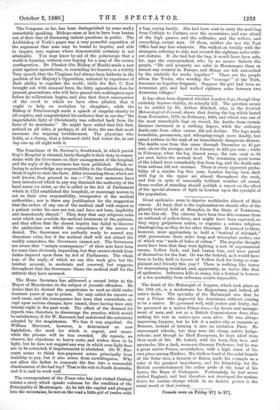The death of the Maharajah of Jeypore, which took place
on the 18th ult., is a misfortune for Rajpootana, and, indeed, all native India. The specialty of the Maharajah was that he was a Prince who improved his dominions, without ceasing to be a native. He governed well, with justice and lenity, but he governed as a native Prince does,—by decree and manage- ment of men, and not as a British Commissioner does, thus making his rule in native eyes seem alive. He was always improving Jeypore, but he left it a native city as separate as Benares, instead of turning it into an imitation Paris. He encouraged schools, but they were the cheap, native hedge- schools ; and though he liked Europeans, he kept aloof from their mode of life. He looked, with his keen, thin face, and spectacles, like a dark, worn-out German Professor ; but he was a great native Prince, nevertheless, with a high sense of his own place among Hindoos. His birth as head of the cadet branch of the Solar race, a dynasty of Rama, made his example as a ruler of the greatest importance, and his friendship for the British counterbalanced the sullen pride of the head of his house, the Rana of Oodeypore. Fortunately, he had never visited England, and had therefore not developed the restless desire for useless change which in an Asiatic prince is the usual result of that journey.


































 Previous page
Previous page